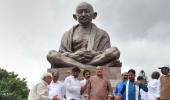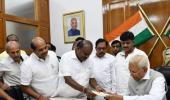Losing power after having come so close, Yediyurappa was determined to regain the reins of power from Kumaraswamy.

From the humdrum existence as a government clerk and a hardware storeowner to becoming the chief minister for a fourth time, B S Yediyurappa has navigated the choppy waters of politics with the consummate ease of a seasoned oarsman.
The rare smile is back on the ever grim-looking Yediyurappa's face as he took over as the chief minister, 14 months after he demitted the office, unable to prove the majority in the state assembly.
In a repeat of sorts, it has not been an easy ascent to power for the 76-year-old Lingayat strongman this time too as a murky legal battle and weeks of political drama preceded his takeover.
Losing power after having come so close, Yediyurappa was determined to regain the reins of power from H D Kumaraswamy, whose party Janata Dal-Secular cobbled up a post poll alliance with the Congress and managed to overthrow his three-day-old Bharatiya Janata Party government on May 19, 2018.
Yediyurappa had to resign as CM as he could not muster a majority after staking claim to form the government on the ground that his party had emerged as the single largest one.
Another interesting element in Yediyurappa's struggle to power this time is, it is being seen as his last chance, considering his age and BJP's policy of retirement from
electoral politics to its leaders who have crossed 75.
A hardboiled Rashtriya Swayamevak Sangh swayamsevak, 76-year-old Bookanakere Siddalingappa Yediyurappa joined the Hindu right organisation when he was barely 15, and cut his political teeth in the Jana Sangh, the BJP's forerunner, in his hometown Shikaripura in Shivamogga district.
He became the Jana Sangh's Shikaripura taluk chief in the early 1970s.
Yediyurappa, who began his electoral politics as Purasabha president in Shikaripura,was first elected to the assembly from Shikaripura in 1983 and went on to win eight times from there.
Along with being party's state unit president, he has also served as opposition Leader in the Legislative Assembly, member of Legislative Council, as also member of parliament.
He is known to have espoused the cause of farmers.
A Bachelor of Arts, Yediyurappa, who was jailed during Emergency, worked as a clerk in the social welfare department before taking up a similar job at a rice mill in his native Shikaripura before he set up his hardware shop in Shivamogga.
He married Maitradevi, daughter of the rice mill owner, where he worked, on March 5, 1967 and has two sons and three daughters.
Yediyurappa may have landed in the hot seat in 2004 when the BJP emerged as the single largest party, but the Congress and JD-S of former prime minister H D Deve Gowda formed an alliance, and a government was formed under Dharam Singh.
Known for his political acumen, Yediyurappa joined hands with Kumaraswamy, Deve Gowda's son, in 2006 and brought down the Dharam Singh government after the chief minister was indicted by Lokayukta in an alleged mining scam.
Under a rotational chief ministership arrangement, Kumaraswamy became the CM and Yediyurappa his deputy.
Yediyurappa became CM for the first time in November 2007 but his term lasted just seven days as Kumaraswamy reneged on a power sharing pact and walked out of the alliance.
He was made the chief minister once again after the BJP came to power in May 2008 but had to step down in July 2011 following his indictment by the then Lokayukta N Santosh Hegde in an illegal mining case.
In the 2008 polls, Yediyurappa led the party to victory, and the first BJP government in the south was formed under him.
Soon controversies swirled around Yediyurappa over alleged abuse of office to favour his sons in allotment of land in Bengaluru and he was forced to resign on July 31, 2011 following indictment by Lokayukta in an illegal mining scam.
On October 15 that year, he surrendered before the Lokayukta court after it issued a warrant against him in connection with alleged land scams,and was in jail for a week.
Sulking after having been made to quit, Yediyurappa broke his decades-long association with the saffron party and formed the Karnataka Janata Paksha.
However, ploughing a lonely furrow, he failed to make the Karnataka Janata Paksha a force to reckon with in state politics but wrecked the BJP's chances of retaining power in the 2013 polls, winning six seats and polling about 10 per cent votes.
As Yediyurappa faced an uncertain future and the BJP looked for a leader with a formidable reputation to lend its campaign the required heft ahead of the 2014 Lok Sabha polls, the two cosied up to each other, leading to the KJP's merger with the BJP on January 9, 2014.
In the Lok Sabha election, the BJP won 19 of the state's 28 seats, a remarkable turnaround for the party which had secured only 19.9 per cent votes in the assembly polls just a year ago leading to the fall of its first government.
Notwithstanding the corruption taint, Yediyurappa's status and clout grew in the BJP.
On October 26, 2016, he got a huge relief when a special Central Bureau of Investigation court acquitted him, his two sons and son-in-law in a Rs 40 crore illegal mining case, which had cost him the chief ministership in 2011.
In January 2016, the Karnataka High Court quashed all 15 first information reports against Yediyurappa lodged by Lokayukta police under the Prevention of Corruption Act.In April that year, he was appointed the state BJP chief for the fourth time.
The Lingayat leader, however, continued to be dogged by controversies, with the anti-corruption bureau launching proceedings against him in an alleged illegal land denotification case, which was stayed by the high court following his plea.
The BJP declared him its chief ministerial candidate in the 2018 assembly polls, ignoring the taunts by the Congress.
As the polls threw up a hung verdict, with no party getting a clear majority in the 225-member House (including Speaker), the Governor invited Yediyurappa to form the government and gave him 15 days to prove the majority.
However,the Supreme Court asked him to prove the majority in the House following a plea by the Congress-JD(S) challenging the governor's decision to invite the BJP to form government.
The three-day-old BJP government collapsed on May 19, minutes before the scheduled trust vote, with him resigning in a tame anti-climax and hours later Kumaraswamy, the chief ministerial candidate of the newly formed JD(S)-Congress alliance, was invited to form the government.
In the last over one year, BJP under Yediyurappa managed to keep the coalition government on tenterhooks as the ruling combine constantly feared poaching of MLAs by the saffron party.
The resignation of 15 rebel Congress-JD(S) MLAs came as a blow to the alliance and it collapsed losing the trust vote on July 23, paving the way for his return.











 © 2025
© 2025